Norris captures Super G title
It turns out the fifth time’s the charm for Russ Norris.
On the final day of the 42nd National Veterans Wheelchair Games (NVWG) in Portland, Ore., the Army veteran and Paralyzed Veterans of America (PVA) Northwest Chapter member finally won the obstacle course known as Super G with a time of 3 minutes, 20.95 seconds.
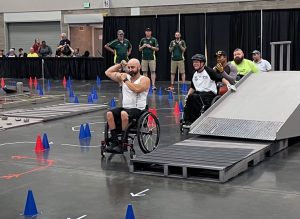
He beat seven other wheelchair athletes, including Marco Bungert (3:33.14), Tony Drees (3:38.92), Jackie Jones (3:56.41), Jeff DeLeon (4:12.68), Paul Austin (5:20.20), Andrew Bechtle (6:06.68) and Mark Sanders (disqualified) for Sunday’s winner-take-all title.
The course is a souped-up version of the obstacle course known as slalom. This year, athletes tackled uneven ground, a pit full of sand, gravel and large rocks, criss-crossed bungee cords and, as usual, a big ramp up to a platform where athletes had to raise and salute the American flag, among other obstacles. Athletes were given time penalties if they didn’t complete an obstacle correctly or knocked over any cones and were disqualified if they completely missed an obstacle.
Norris, who served from 2002 to 2008 and sustained a level L1 incomplete spinal-cord injury (SCI) in a 2008 four-wheeler accident, says it feels good to finally win.
“I’ve been so close,” says the 43-year-old Tacoma, Wash., resident, who was competing in his seventh NVWG. “My first games in Philadelphia [in 2014], I was a novice. I made the Super G. Once I got a taste of that, every year I was going for it. And I qualified for Super G every time I’ve been through the slalom, and a few times I lost it by a couple seconds. A few times I lost it by more than a couple seconds, but to finally win it, it feels really good. All that hard work finally paid off.”
When he got to the pit of sand, gravel and large rocks, Norris used a plan that worked well for him once before at the 2021 NVWG in New York. He went airborne and launched himself into it.
“The further you get in the sand, the less work,” he says. “The sand is one of the hardest parts to get through, so I thought if could jump halfway through it, then that makes it less work.”
He says it was an honor to be part of the Super G, and the course was much harder than last year’s in Tempe, Ariz.
“Every year, nothing’s guaranteed. You have to be one of the top-two fastest times, and most important thing for me is when I’m running those first courses, any of the new guys or anybody that’s newer to it, I would want to see them succeed than for me to succeed. But if it works out, it’s a bonus,” he says.
Army veteran and PVA Northwest Chapter member Bechtle made it to the Super G for the first time after previously competing in the obstacle course known as slalom five times. He even had a special shirt made for the occasion that said, “If you can see my butt, please put me back in my wheelchair.”
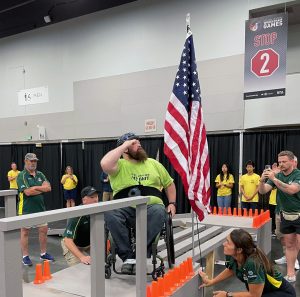
The 36-year-old Federal Way, Wash., resident, who served from 2005 to 2014 and sustained a level L1 SCI in a 2013 rollover accident, says it was unbelievable to be one of the eight top competitors and was just proud that he completed it.
He says he didn’t do anything to prepare this year, but he plans to change that for next year in New Orleans.
“I’m planning on just trying to find more obstacles out in everyday life and just try to challenge myself to get over it,” Bechtle says. “If there’s a 4-inch curb, I might try to go over it instead of using the ramp to go up.”
He says it was also impressive to watch the Games’ first motorized wheelchair version of the Super G.
“There’s no way I could operate the power chair the way they do,” he says. “I’m glad they have that because when my shoulders start going bad and I’m in a power chair, I’m definitely doing that.”
Team Sockeye Slams
Team Sockeye beat Team Big Bass, 41-37, to capture the wheelchair rugby gold medal Sunday night at the 42nd National Veterans Wheelchair Games in Portland, Ore.
The round-robin tournament featured three teams: Sockeye, Big Bass and Cutthroat. Team Sockeye won two of its three games to advance to the final.
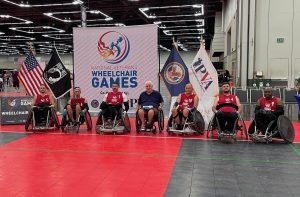
Team Sockeye led by seven points at the end of the second quarter, but Team Big Bass closed the gap to three by the end of the third and kept it close until the end.
Army Reserve veteran and PVA Michigan Chapter Sports Director Scot Severn, who played for Team Sockeye, says it felt good to help his team get the win, especially after missing last year’s championship game in Tempe, Ariz., due to coming down with the novel coronavirus (COVID-19) four days into the NVWG.
The 54-year-old from Caro, Mich., who sustained a level C7 SCI from a lightning strike in 1989, says his team played well, except for the third quarter.
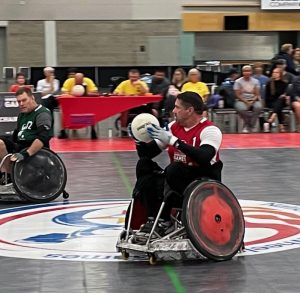
“When we held ourselves together, when we pulled our heads out of our you know what, it worked out,” Severn says. “I think the other team was stacked. They should have easily beat us. As a team, we should have built on our lead but we, I, myself, made a lot of mistakes, but luckily we had a big enough lead that we were able to overcome those.”
Severn, a four-time Paralympian and two-time Paralympic medalist in shot put, has been coming to the Games on and off since 2004. The past year has been rough for him. Both his parents passed away, and he battled a host of medical issues, including a stroke last September. He says he hasn’t been playing wheelchair rugby at home and lost 30 pounds since the stroke. But he enjoys playing the sport at the Games.
“I just love it because we actually get a crowd of people watching,” Severn says. “We’ve had some crowds at these games that rivaled the Paralympic Games.”
Marine Corps veteran and PVA Buckeye Chapter member James Trzop, who also played for Team Sockeye, agrees with Severn that it’s a different feeling playing at the NVWG versus with his team. the Akron Rhinos, at home in Ohio.
This year was just the second time the 28-year-old Cleveland resident, who served from 2013 to 2014 and sustained a level C6-7 SCI in a 2013 diving accident, has played wheelchair rugby at the NVWG. It’s his fifth Games overall.
“It’s really nice to come out here and play with other veterans and get to know everybody,” he says. “It’s a bit different, too, because I haven’t played with any of those guys before, so it’s like learning to play with a new team. You have to learn new strategies. It’s a great learning experience.”
Trzop, who has played three seasons as a low-pointer with the Rhinos, says he did well picking and blocking in Sunday’s championship game but his catching and passing could improve. When Team Sockeye’s lead started shrinking, he says the players did a good job of staying calm and not panicking.
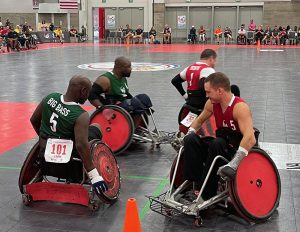
“We recalibrated, went back out there and played hard and were able to come away with the win,” Trzop says.


